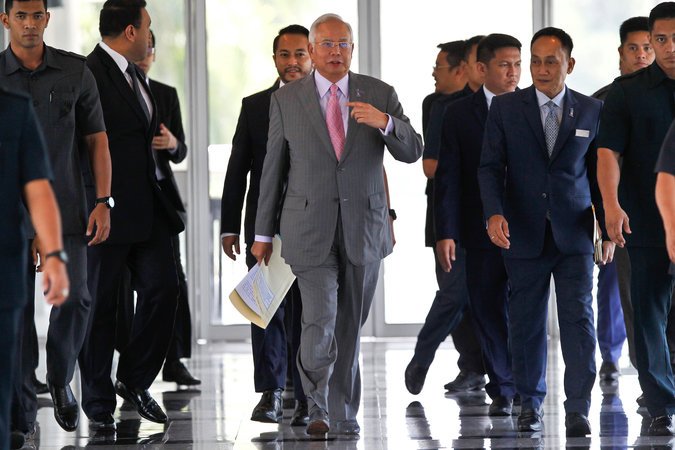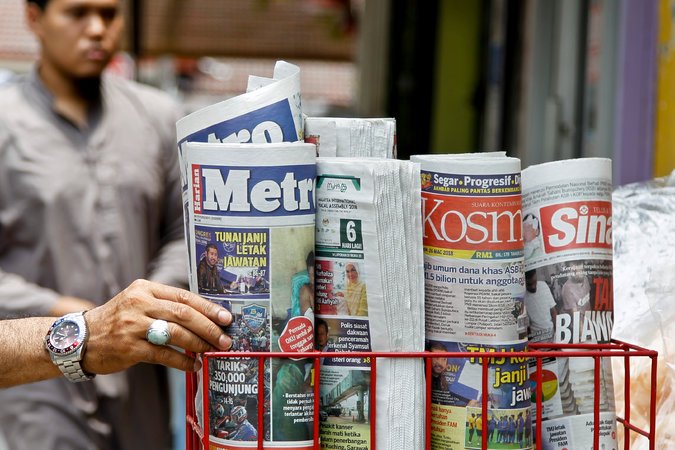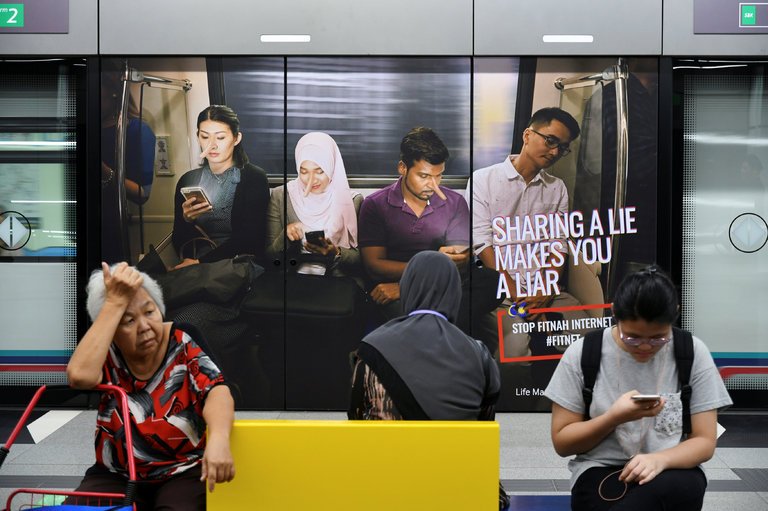As Malaysia Moves to Ban ‘Fake News,’ Worries About Who Decides the Truth
KUALA LUMPUR, Malaysia — In highway billboards and radio announcements, the government of Malaysia is warning of a new enemy: “fake news.”
On Monday, the lower house of Parliament passed a bill outlawing fake news, the first measure of its kind in the world. The proposal, which allows for up to six years in prison for publishing or circulating misleading information, is expected to pass the Senate this week and to come into effect soon after.
The legislation would punish not only those who are behind fake news but also anyone who maliciously spreads such material. Online service providers would be responsible for third-party content, and anyone could lodge a complaint. As long as Malaysia or Malaysians are affected, fake news generated outside the country is also subject to prosecution.
What qualifies as fake news, however, is ill defined. Ultimately, the government would be given broad latitude to decide what constitutes fact in Malaysia.
Advertisement
Continue reading the main story
“Fake news has become a global phenomenon, but Malaysia is at the tip of the spear in trying to fight it with an anti-fake news law,” said Fadhlullah Suhaimi Abdul Malek, a senior official with the Malaysian Communications and Multimedia Commission. “When the American president made ‘fake news’ into a buzzword, the world woke up.”
Continue reading the main story
But members of Malaysia’s political opposition say the legislation is intended to stifle free speech ahead of elections that are widely seen as a referendum on Prime Minister Najib Razak, who has been tainted by a scandal involving billions of dollars that were diverted from Malaysia’s state investment fund.
“Instead of a proper investigation into what happened, we have a ministry of truth being created,” said Nurul Izzah Anwar, a lawmaker from the People’s Justice Party and the daughter of the jailed opposition leader Anwar Ibrahim.

An inquiry by the United States Department of Justice found that associates of Mr. Najib had mishandled at least $3.5 billion connected to the 1 Malaysia Development Berhad fund, known as 1MDB. American officials have been working to seize about $1.7 billion in assets and have expanded the scope of their inquiry to include a criminal investigation.
The Department of Justice traced $731 million deposited into bank accounts controlled by Mr. Najib to 1MDB. Mr. Najib, who is referred to in American documents simply as Malaysia Official 1, has said most of the money was a gift from a Saudi patron.
A broad alliance of Malaysian opposition parties has tried to foster public outrage over the 1MDB scandal in order to sink Mr. Najib’s efforts to secure a third term. Elections must be held by August and are widely expected to take place before the end of May.
The fake-news legislation targets “any news, information, data and reports which are wholly or partly false, whether in the form of features, visuals or audio recordings or in any other form capable of suggesting words or ideas.”
The Malaysian authorities say the bill intends to protect individuals and businesses from online attacks. “The public wants a law to protect Malaysians from fake news,” said Salleh Said Keruak, the Malaysian minister of communications and multimedia. “If you are a victim of something that’s viral but fake, your life is ruined.”
Advertisement
Continue reading the main story
Mr. Salleh said that Malaysia’s various legal mechanisms — including a strict penal code, the Printing Presses and Publications Act, the Sedition act, and the Communications and Multimedia Act — do not provide ample defense against misinformation.
But that view is not held by some in the legal community.
“You would think that we have more than adequate protection against any mischief that might be considered fake news,” said Lim Chee Wee, the former secretary of the Malaysian Bar. “We have a rather comprehensive set of laws.”

Since irregularities in the investment fund came to light three years ago, a slew of politicians, writers and even a political cartoonist have been charged with offenses such as sedition and defamation. The attorney general, who was looking into the fund’s finances, was fired. Some publications that covered the 1MDB scandal have been censored or shuttered.
Late last month, Jailani Johari, Malaysia’s deputy minister for communications and multimedia, gave his definition of what would fall under the new bill: Any information about 1MDB that has not been verified by the government, he said, “is deemed as fake news.”
The Malaysian government says it has conducted various inquiries into allegations of money laundering and graft connected to 1MDB but has found no evidence of wrongdoing by Mr. Najib. Officials from 1MDB say no money is missing from the fund.
Newsletter Sign Up
Continue reading the main story
Please verify you're not a robot by clicking the box.
Invalid email address. Please re-enter.
You must select a newsletter to subscribe to.
Sign Up You agree to receive occasional updates and special offers for The New York Times's products and services.
Thank you for subscribing.
An error has occurred. Please try again later.
You are already subscribed to this email.
View all New York Times newsletters.
- See Sample
- Manage Email Preferences
- Not you?
- Privacy Policy
- Opt out or contact us anytime
Mr. Salleh, the communications and multimedia minister, walked back his deputy’s statement on 1MDB, saying that simply mentioning the existence of the Department of Justice investigation, for instance, would not constitute a breach of the law. However, tying Mr. Najib to specific dollar amounts connected to 1MDB, he said, could be a prosecutable offense.
“There is freedom of speech in Malaysia,” Mr. Salleh said, “but there will be no freedom to circulate false news.”
The bill against fake news is not the only divisive legislation passed or under consideration in Malaysia in the prelude to the elections. On Saturday, Parliament signed off on a redrawing of voting districts, prompting cries of gerrymandering from opposition parties. Like the bill condemning misinformation, the proposal on voting boundaries was debated and passed in a matter of hours.
Malaysia has been governed by a single coalition since independence. In 2013, the coalition, which is dominated by Mr. Najib’s party, the United Malays National Organization, lost the popular vote for the first time. With the cost of living rising in Malaysia, Mr. Najib’s traditional support base of rural voters could decline further.
“These new laws are designed to create fear and make people think there’s no way to stop the prime minister from winning re-election,” said Charles Santiago, a lawmaker from the Democratic Action Party. “But the government cannot say that everything is fake. Truth still matters in Malaysia.”
Follow Hannah Beech on Twitter: @hkbeech.
Sharon Tan contributed reporting.
Continue reading the main story Read the Original Article




























